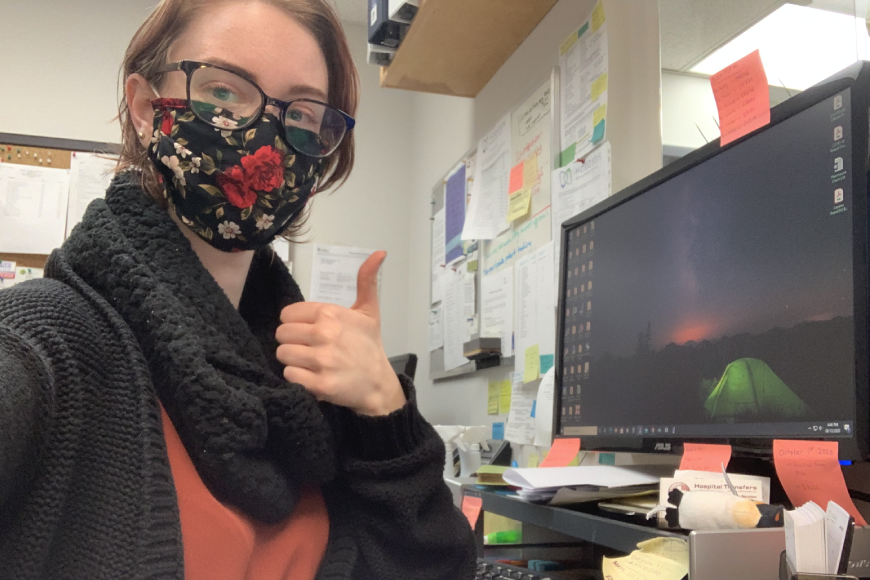
While I was interviewing for Co-op placements, administrative work was not something I was actively seeking out due to my lack of experience in an office environment. In the first few months of my first Co-op placement, I fought the lingering feelings of imposter syndrome. My placement was so incredibly different from my previous day job; administrative work is a full 180 degrees turn from a night-shift waitress! It was difficult to ward off the insecurities I felt.
Was my job really that hard? Is my role actually that meaningful or am I doing something that anyone could do? Am I really THAT important?
After 8 months in my position as a Front Desk Coordinator in a busy allied-health provider clinic, I have realized that I’ve acquired a multitude of skills and have gained an insight into administration that I would not have without my Co-op work term. And most importantly, I’ve learned that administrative work does matter!
First Impressions
With first impressions being formed in as little as 50 to 100 milliseconds (Todorov et al., 2009), we have all heard about how important a good first impression is from your parents to your coop advisors, to your professors. In this case, as administration staff manning the front desk, YOU are always the first impression!
Being the first point of contact for your employer, the impression that you leave on clients is long-lasting because you are the first representation of the company that they will encounter. Amidst the many different coworkers that clients will meet, an initial polite and friendly face is easily remembered in a positive light and can be reassuring later on. For me, working in the healthcare field where small details can be missed by patients and complex concepts can be confusing, this kindness can foster an open environment where those who are nervous to ask questions can do so or ask to have something explained again, without the fear of appearing to be bothersome.
You Have a Call on Line One…
On busy days when the phone is ringing off the hook, it feels as if answering the phone is my whole job. However, being the one who answers the phone is more than simply transferring calls to others!
Answering phone calls is a lesson in communicating effectively, whether it’s between yourself and clients, or your supervisors, or simply passing along a message to someone else. Nobody wants to be stuck on the phone when they make a call to a business, so knowing the right questions to ask to get the information that you need as quickly as possible is imperative. As well, the administrative is constantly acting as a filter, condensing the information that needs to be relayed by filtering out unneeded details to speed things up; coworkers definitely appreciate a 30 second ‘heads-up’ over a 5-minute phone call!
Most importantly, the administration is the ‘gatekeeper’ of the front desk. A lot of clients who call in want to talk to supervisors or clinicians who are busy and don’t normally have time to spend on the phone. The task of finding out what these people need and if they truly need to speak to someone else has been delegated to you! With some gentle probing and investigating for details, most questions can be answered, and situations can be resolved simply by speaking to the administrative alone, without the need to involve anyone else.
Variety is the Spice of Life (and the Front Desk)
When most people think of an office job, one of the first things that come to mind is the monotony of doing the same thing every day, over and over again while sitting at your desk, but that’s just a myth!
Because the majority of my day is spent interacting with different people, no two days are exactly the same. Experiencing different scenarios means that you have to constantly adapt and change in order to satisfy clients and carry out what needs to be done to the best of your ability. This can provide numerous opportunities to grow or learn new skills to manage a consistently evolving role. I gained conflict resolution skills through navigating client's frustrations due to funding agency delays, problem-solving skills from appointment booking and working within clinician and patient schedules, and communication skills from answering the phone and running the front desk email inbox. The possibilities to add to these skills and for further personal development are endless!
Organization, Organization … Did I Mention, Organization?
Despite working with a multitude of other coworkers, sometimes being the singular person at the front desk means a lot of responsibility … and a lot of things to do! From handling cash payments, meeting deadlines, and following up on issues or clients, there’s always something vying for your attention.
With so many different things to get done and seemingly not enough time in the day, time management is key. Sometimes delegating work isn’t an option (you’re going to have to get back to this specific person eventually!), so knowing how to manage time wisely and ‘when to do what’ is super important! Others may not realize it, but the administration is consistently categorizing and prioritizing their day in order to efficiently get everything done promptly and on time.
This constant organization also means that specific tasks and processes need to be supervised and fully carried out from start to finish, to prevent missing any steps in-between. In my role, this was submitting government and non-government funding applications, watching for approvals before the delivery appointment date, invoicing funding agencies, and gathering all the signatures needed to complete this process. There’s no quitting in the middle of the journey here! Persistently “keeping an eye out” to predict issues that can arise (like the fact that maybe I should call this funding agency because we don’t have approval and this appointment is next week…) happens to ensure everything runs smoothly. Everything may look calm, cool, and collected, but there’s a lot of ‘behind-the-scenes’ magic and organization by the administrative assistant to make that happen!
The Take-Away
The take-away message here is that we’re all tough on ourselves sometimes and everyone has moments of self-doubt. It can be easy to underestimate how easy or difficult some things are because we haven’t experienced them yet, and I found this to be true about administrative work! I initially thought my role was going to be a breeze and actually experienced a steep learning curve that I wasn’t expecting, which made the Imposter Syndrome hard to shake off. Give it some time and don’t underestimate yourself because at the end of the day, what you are doing IS important and IS making a difference!
References
Todorov, Alexander, Pakrashi, Manish, & Oosterhof, Nikolaas N. (2009). Evaluating Faces on Trustworthiness After Minimal Time Exposure. Social Cognition, 27(6), 813–833. https://doi.org/10.1521/soco.2009.27.6.813















